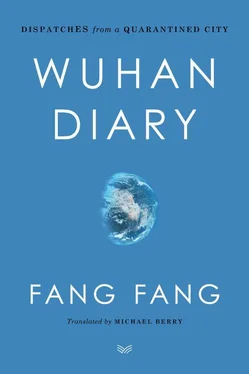I think my classmate’s comments make sense. I’m a layperson when it comes to these issues, so I won’t add any additional commentary. Normally, I don’t believe in any of those traveling healers. I once went to see a private Chinese medicine doctor about a problem I was having with my foot; the treatment he prescribed was incredibly expensive and, in the end, the medicine he gave me only made my condition worse! In the end, I just went to see a doctor trained in Western medicine to fix the problem. Ever since then, I usually stick to Western medicine. But occasionally I still use some Chinese herbs for little everyday things. But like many others, I also feel that if Li Yuehua says he has a method that can treat the coronavirus, then what’s all the fuss about? Let’s at least let him give it a try? Didn’t Deng Xiaoping have a famous saying: “It doesn’t matter if a cat is black or white, as long as it catches mice it is a good cat.” Let me use it here: “It doesn’t matter if it is Chinese or Western medicine, if it can cure a patient it is good medicine.” We need to be practical when treating patients, especially during an emergency situation like this one. There is nothing more important than saving human lives, so why don’t we give this a chance? And if, in the process, he ends up getting exposed as a charlatan, all for the better; let’s get it all out there in the open!
March 2, 2020
People in the future will need to know what everyone in Wuhan went through.
It is raining again and extremely overcast. It feels as cold as it was back during the Lunar New Year. One of my colleagues braved the rain to deliver some steamed buns, Mandarin rolls, and some other snacks to me. I have lived in the Literary and Arts Federation compound for 30 years now, and my neighbors and colleagues have always looked out for me, for which I am especially thankful. Tonight I will eat Mandarin rolls and a bowl of millet porridge. As I said before, cooking for one is never much fun.
These days I tend to stay up late each night and sleep in the next morning. By the time I saw the messages my doctor friend had sent me, it was already noon. In contrast to his rather sullen mood from yesterday, today my doctor friend seems rather excited. That is because he figured out the reason for yesterday’s spike in new cases; most of them came from a group of 233 inmates who all tested positive. We also saw the Hubei government’s swift response, which came in the form of several prison officials being fired. The speed with which the government responded was quite shocking. Then today, for the first time, the number of new cases dropped below 200; new suspected cases also fell to under 100. According to my doctor friend: “There is now hope that within two or three days we could be entering a new low rate period (meaning fewer than 100 new infections a day) in the trajectory of this virus.” There is hope for the people of Wuhan yet. Does this mean that they might be able to reopen the city earlier than expected? That is precisely what the nine million residents of Wuhan are most hoping for. I asked my friend about that tonight and he said it still might be another two weeks. That would still be a bit ahead of schedule, but at least we won’t have to continue on like this into April.
“Depressed” is still the word that I would use to describe my impression of Wuhan people these past few days. Today online I noticed quite a few people all using the words “city of sadness” to describe Wuhan. I don’t know quite what to say; if you use the word “sadness” to describe what the city of Wuhan was going through during the Lunar New Year, I would argue that it doesn’t even come close to describing the seriousness of the situation. Perhaps you could modify sadness with the word “bitter” and we might be getting a little closer to the reality. All you have to do is reread Chang Kai’s last words and you will know what bitter sadness means. A few days ago there was an essay about what a medical worker from Guangdong experienced when he first came to Wuhan to provide aid. This description was included in the essay: “I remember on the second day of the Lunar New Year, I was assigned to the critical care unit around noon; within that first hour or two three patients already died. That night another two patients lost their fight with the coronavirus. There was one day when a patient came into the ER but died before we could even get him into a room. During those first few days there were simply too many patients; at the peak we were seeing between 1,500 and 1,600 patients a day coming in with a fever.” And that is just the situation at a single hospital in Wuhan; now multiply that by all the other hospitals in the city. Just think about how many scenes like that are playing out simultaneously throughout the city. I hope that when they have time, some of those medical workers from all over China who came to Wuhan to provide support during this outbreak can get what they saw and experienced here down on paper. I’m sure that this is the kind of experience that will stay with them for the rest of their lives. But I hope they get it down on paper because people in the future will need to know what everyone in Wuhan went through.
This reminds me, I wonder if those reporters who had been reviewing what happened here in Wuhan are still doing their investigative reports? For those of us in the city, this is extremely important work. Now that things are starting to turn around, their investigations into what happened need to be on the agenda. Otherwise, time will slip by and all the pain and sadness we experienced will fade away with it. What I fear is that once people get back to their normal, happy lives, no one will be willing to revisit this painful moment; instead they will do everything they can to forget about those people like Chang Kai who died amid this tragedy. That also reminds me of a suggestion someone made about building a memorial to the victims of the coronavirus. I hope they leave space on that memorial to etch Chang Kai’s final words into stone. When future generations read those words, they will be able to get a sense of the catastrophe we lived through in Wuhan during 2020. Everyone in Wuhan, including those medical practitioners who worked so hard to save their patients, should all fully support those journalists’ investigations into what actually happened: Who was responsible for that 20-day delay? It was precisely those 20 days that cost more than 2,000 people their lives and caused many thousands more to be sick today, and it is still uncertain if they will be able to make it; nine million people ended up quarantined in their homes and five million people were trapped outside Wuhan, unable to return home. This isn’t something we can let go. This is one buck that cannot be passed. I read an essay today entitled “The Story Behind Why Specialists Missed the Boat on Reporting an Unidentified Respiratory Disease,” and there was a section that read: “As he was recounting what happened to China News Weekly , Zeng Guang banged the desk and asked, ‘You really think I even heard of anyone named Li Wenliang or Zhang Jixian?’” My dear brave journalists, if you still have a conscience, please continue fighting the good fight! Please listen to the voices of the nine million Wuhan residents who stayed behind and the other five million who were left drifting. We all want to know who has been hiding the truth from us!
After 40 days of quarantine, people are reaching their psychological breaking point; this is something I have been very concerned about from the very beginning. I know that there are a lot of counseling and help hotlines you can find online, but I’m not sure if they are really addressing the real problems people are facing. Most happy families are quite similar, but unhappy families each suffer from their own set of misfortunes. I read an article entitled “Nine Million Different Kinds of Broken Hearts in Wuhan”—talk about a title! The article contains stories culled from dozens of posts by people from Wuhan who have been writing online about their difficult experiences. Letting your emotions out through talking or writing is an important psychological outlet for dealing with stress; this is actually part of why I keep this diary going every day. However, the label “positive energy” [3] “Positive energy” ( zheng nengliang ) is here referencing a political term coined by the General Secretary of the Communist Party of China, Xi Jinping, in 2012. It is usually referred to as discourse that is “politically correct” and aligns with the views and policies of the Chinese Communist Party. Public discourse that challenges or goes against the party line is referred to as “negative energy” ( fu nengliang ).
keeps getting periodically thrust on those individuals who are just trying to find an outlet for release. It is a label that sounds completely appropriate and proper, the kind of label that a lot of people are eager to champion. But if you cry and make all your complaints public, they will claim that you are creating a panic, you are sabotaging the war against the coronavirus, and you’ve become part of the “negative energy.” The destruction of negative energy is the incumbent duty of positive energy. My god, if people in this world use such a simpleminded perspective to understand and judge the things around them, then I suppose that I have been brought into this world in vain. If “positive energy” starts taking on this ignorant and arrogant guise, then I really have no idea what is so “positive” about it. Whoever said that after we cry and complain, we can’t get back on our feet and continue moving forward?
Читать дальше



![О Генри - Закупщик из Кактус-Сити [The Buyer from Cactus City]](/books/405348/o-genri-zakupchik-iz-kaktus-thumb.webp)








